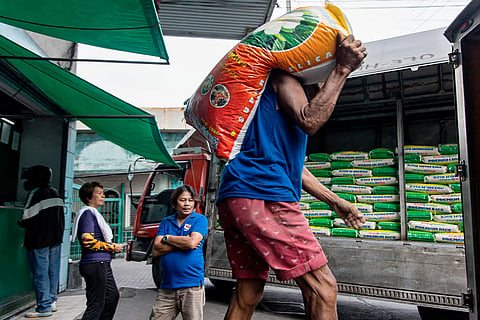
- NEWS
- the EDIT
- COMMENTARY
- BUSINESS
- LIFE
- SHOW
- ACTION
- GLOBAL GOALS
- SNAPS
- DYARYO TIRADA
- MORE

The Department of Trade and Industry will review existing regulations on price tagging for manufactured goods and adapt them to agricultural commodities, especially rice.
Trade Secretary Cristina Roque said the department will collaborate with the Department of Agriculture to explore “creative ways” to bring rice prices down to more reasonable levels and alleviate the financial burden on Filipino consumers.
The elevated price of rice contributed to the high inflation throughout the first half of 2024, preventing the Bangko Sentral ng Pilipinas from lowering interest rates, which is crucial for stimulating investments and generating jobs.
On average, Filipino consumers spend nearly P10 of every P100 on rice, with the burden even greater for households in the bottom 30 percent of the income bracket.
Roque and Agriculture Secretary Francis Tiu Laurel Jr. have agreed to draft a memorandum of understanding to expedite efforts to address the persistently high price of rice and eventually other essential commodities.
By addressing supply and pricing issues, the government aims to stabilize the price of rice and make it more affordable for consumers around the country.
Meanwhile, Laurel said the DTI and DA collaboration will focus on imported rice, but stressed that the government’s efforts would extend beyond that.
“Imported rice is just the beginning,” Laurel said. “We plan to cast the price net wider to include other imported food commodities like vegetables and meat, ultimately benefiting the Filipino consumer.”
Roque, who also chairs the National Price Coordinating Council (NPCC), said she would soon convene the inter-agency council to review strategies aimed at stabilizing food prices and ensuring fairness in the market. The DA is also part of the NPCC.
“We aim to strike a balance between business sustainability and consumer protection,” Roque said. “We want the public to know that we are leaving no stone unturned in our efforts to ease the burden on Filipino consumers.”
Both agencies are working to determine a maximum suggested retail price for rice. The goal is to enable rice importers and retailers to operate profitably while protecting consumers from excessively high prices.
In parallel, the DA is considering declaring a national food security emergency, which would give Laurel the authority to release rice stocks held in reserve by the National Food Authority and help to increase supply and bring down retail prices.
The DA secretary is also chairman of the NFA Council.
Last week, Laurel said they plan to remove brand labels on imported rice to fight alleged price manipulation in local markets.
